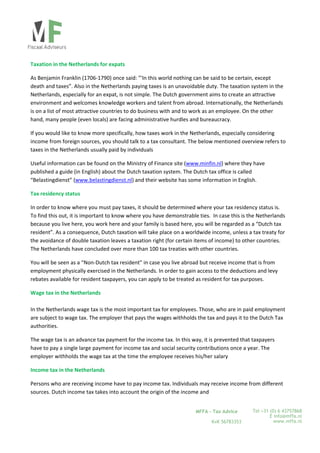
Taxation in the netherlands for expats-foreigners
- 1. Tel +31 (0) 6 43757868 E info@mffa.nl www.mffa.nl MFFA – Tax Advice KvK 56783353 Taxation in the Netherlands for expats As Benjamin Franklin (1706‐1790) once said: "'In this world nothing can be said to be certain, except death and taxes”. Also in the Netherlands paying taxes is an unavoidable duty. The taxation system in the Netherlands, especially for an expat, is not simple. The Dutch government aims to create an attractive environment and welcomes knowledge workers and talent from abroad. Internationally, the Netherlands is on a list of most attractive countries to do business with and to work as an employee. On the other hand, many people (even locals) are facing administrative hurdles and bureaucracy. If you would like to know more specifically, how taxes work in the Netherlands, especially considering income from foreign sources, you should talk to a tax consultant. The below mentioned overview refers to taxes in the Netherlands usually paid by individuals Useful information can be found on the Ministry of Finance site (www.minfin.nl) where they have published a guide (in English) about the Dutch taxation system. The Dutch tax office is called “Belastingdienst” (www.belastingdienst.nl) and their website has some information in English. Tax residency status In order to know where you must pay taxes, it should be determined where your tax residency status is. To find this out, it is important to know where you have demonstrable ties. In case this is the Netherlands because you live here, you work here and your family is based here, you will be regarded as a “Dutch tax resident”. As a consequence, Dutch taxation will take place on a worldwide income, unless a tax treaty for the avoidance of double taxation leaves a taxation right (for certain items of income) to other countries. The Netherlands have concluded over more than 100 tax treaties with other countries. You will be seen as a “Non‐Dutch tax resident” in case you live abroad but receive income that is from employment physically exercised in the Netherlands. In order to gain access to the deductions and levy rebates available for resident taxpayers, you can apply to be treated as resident for tax purposes. Wage tax in the Netherlands In the Netherlands wage tax is the most important tax for employees. Those, who are in paid employment are subject to wage tax. The employer that pays the wages withholds the tax and pays it to the Dutch Tax authorities. The wage tax is an advance tax payment for the income tax. In this way, it is prevented that taxpayers have to pay a single large payment for income tax and social security contributions once a year. The employer withholds the wage tax at the time the employee receives his/her salary Income tax in the Netherlands Persons who are receiving income have to pay income tax. Individuals may receive income from different sources. Dutch income tax takes into account the origin of the income and
- 2. 2/3 distinguishes three categories. These categories are known as “boxes”. The income in each of the three boxes is taxed at a different rate (see below) Box 1, income from labour and owner‐occupied dwelling (taxed at progressive rates up to 52%) includes the income from the following sources: ‐ present and past employment ‐ business activities ‐ periodical payments and pensions from individuals (e.g. alimony) or insurance institutions ‐ owner‐occupied dwelling Box 2, income from substantial shareholdings, includes dividends and capital gains derived from substantial shareholdings in resident and non‐resident companies. Flat rate of 25% Box 3, income from savings and investments, replaces ordinary taxation of all types of income from capital, other than deemed income from an owner‐occupied dwelling (Box 1) and dividends and capital gains from substantial shareholdings (Box 2). Taxation of Box 3 is based on a 4% deemed yield on net assets; the deemed yield is taxed at a flat rate of 30% Filing your income tax in the Netherlands In the Netherlands income tax returns must be filed digital before 1 April of every year. People who have migrated to the Netherlands during the previous year will receive a so‐called M‐form and must filed it before 1 July. To file a tax return, you will need a digital signature or DigiD (www.digid.nl) or the services of a tax consultant. Especially, in the year of arrival and the year of departure filing an income tax return may result in a substantial rebate. Tax returns can be completed retrospectively for a period of five years. 30% ruling in the Netherlands To attract employees from abroad with specific skills, the Netherlands introduced a special tax incentive called 30% ruling facility. The reason to introduce this facility is that if an employee comes to the Netherlands to work, they may face additional expenses (“extraterritorial expenses”). The 30% ruling allows employers to compensate their 'extraterritorial' employees for expenses they incur in connection with the fact that they are working outside their home country. This is done by means of a fixed cost allowance of 30% of the wage. In order to apply for the 30% rule, the employee must be living prior to the start of the employment 150 km from the Dutch border. Also, the employee must earn € 35,770 as a taxable income. The salary norm for a master student up to the age of 30 is € 27.190. The salary norm does not apply to employees (f.e. PhD) who work in the Netherlands in the area of teaching and research at certain educational institutes, including universities, designated for this purpose. For the last two categories of people special rules apply with respect to the 150 km requirement.
